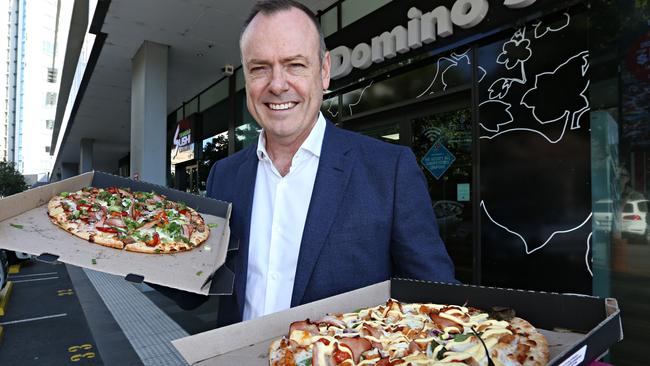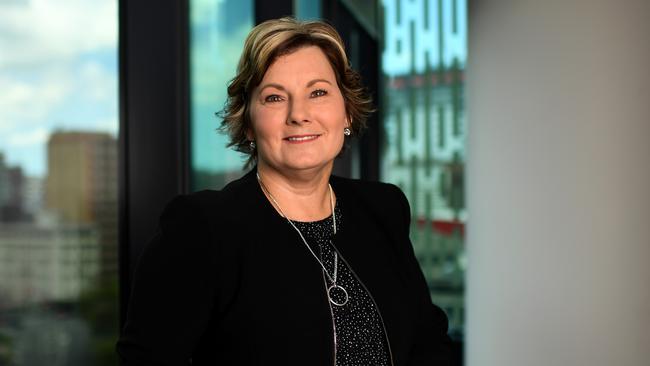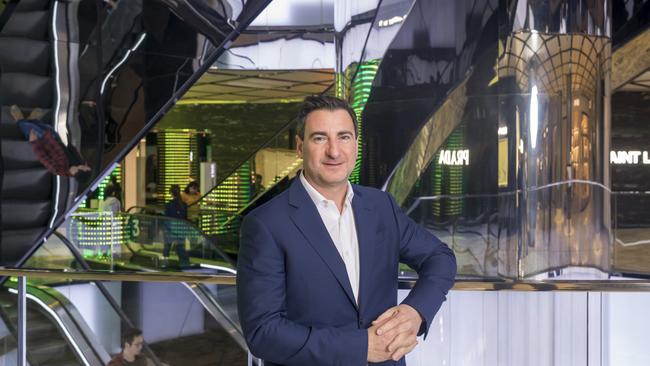CEOs reveal fragile state of consumers
The reporting season has revealed a sharper picture of the economy, with consumers desperately trying to preserve their standard of living while anxiously awaiting an interest rate cut.

The nation’s leading chief executives overseeing consumer-focused, listed companies have revealed the fragile state of the shopper, with discounting and promotions now seen as vital to bring business through the door.
Midway through reporting season and a sharper picture has emerged of a consumer desperately trying to preserve their standard of living while anxiously awaiting an eventual cut in interest rates to deliver some relief.
With household budgets stretched by rising costs of living, from food and groceries to insurance and dentist bills, to still stubbornly high inflation and interest rates, consumers are becoming increasingly picky as to where and how they spend their disposable income.
Australians still love to gamble and not even the cost-of-living crisis has dented that hobby, with The Lottery Corporation chief executive Sue van der Merwe revealing to the market on Wednesday that, based on recent sales of lottery tickets, the economy was showing signs of improving.
Ms van der Merwe said over the past year there had been a decline in the frequency of people buying tickets and overall spending, but this was starting to hit a bottom from which it was now recovering.

“Over the last two or three months the impact of people adjusting some of the frequency and spending (on lottery tickets) has stabilised,” Ms Van der Merwe said. “In some cases, we’re starting to see improvement in sales on a like-for-like basis for some of our games. So right now we continue to see the resilience we have always seen in this business.”
Many CEOs of leading retail empires are having to pull the lever on discounting and promotions to keep shoppers’ attention and loyalty.
Bapcor’s interim chief executive, Mark Bernhard, told investors the company was having to undertake increased promotional and discounting activity to retain its market share across its auto retail brands – including Midas, Autobarn and Burson Auto Parts – amid fierce competition as discretionary retailers battle to entice customers.
“We’ve got our own promotional activities going on because we don’t want to give up any share in any of the businesses,” Mr Bernhard said.
“You’re seeing promotional activities from the majority of our competition as well, but we’re pretty confident with where we had it on margins.
“Margins are holding up fairly well as we look to sell across different ranges, and work with suppliers as well.”
New Zealand, which has begun to cut interest rates amid inflation levels that are lower than in Australia, appeared to have bottomed out from a low point in its retail cycle, according to Mr Bernhard, who was confident that Australia would follow suite over the coming year.
“We are starting to see New Zealand turn around across the board with strong improvements, which is a positive sign for us,” he said. “I see New Zealand as a lead indicator for Australia. Hopefully we’re right and New Zealand starting to turn the corner is something that augurs well for Australia.”

As it was for auto parts it goes for takeaway food, with Domino’s Pizza CEO Don Meij working hard through 2024 to strip out savings from his back-of-store operations to deliver value for diners but also profits for shareholders.
“Customers are savvy, and they want choice, and it’s a competitive environment,” Mr Meij told The Australian after he reported the pizza company’s latest financial results.
“So because of the scale of our pizza business, we’re often competing with a burger meal or a fried chicken meal, and we’ve made ourselves quite competitive with great value.
“We didn’t do a very good job at the beginning of inflation, we made some mistakes, particularly pricing mistakes. We then realised it and we worked very hard. So the Australian and New Zealand business was the petri dish for the rest of our business, where we went in and heavily focused on how do we inspire customers in an inflationary environment?”
Elliott Rusanow, the chief executive of shopping centre landlord Scentre Group, said the performance of shops was very much dependent on the retailer.
“It actually depends on the brands themselves,” Mr Rusanow said.
“Clearly luxury has been called out, I think generally, as an area which isn’t growing as much as it has. It went through phenomenal growth particularly post-Covid.”
Mr Rusanow said brands that interacted more with their customers were showing growth within categories that overall might not be showing growth. He said it was “difficult for us to see [the impact of a slowdown] because theoretically, it’s hitting areas that are more discretionary like travel”.
“I think the Australian consumer has been resilient; the reality is that they’re not growing at … rates that should be concerning the RBA,” he said.
“They’re probably growing at rates which are more sustainable for the longer term.”
Mr Rusanow downplayed the impact of stage three tax cuts.
“We’re seeing a continuation of the existing trends. So we’re not seeing anything unusual because of tax cuts,” he said.
Brambles chief executive Graham Chipchase said that in Australia there was “still a little bit more to go” in terms of destocking, compared with in the US, suggesting there was still softness in the Australian economy. But he said this was partly to do with seasonality.
“We’ve got to get through the Christmas period. This is the important time in Australia. So we anticipate that probably in early calendar next year, we might see a bit of flow back of pallets,” Mr Chipchase said.
Because Brambles’ CHEP pallets are used to transport goods, it can be an indicator of what is still sitting in storage, rather than on shelves for sale.




To join the conversation, please log in. Don't have an account? Register
Join the conversation, you are commenting as Logout